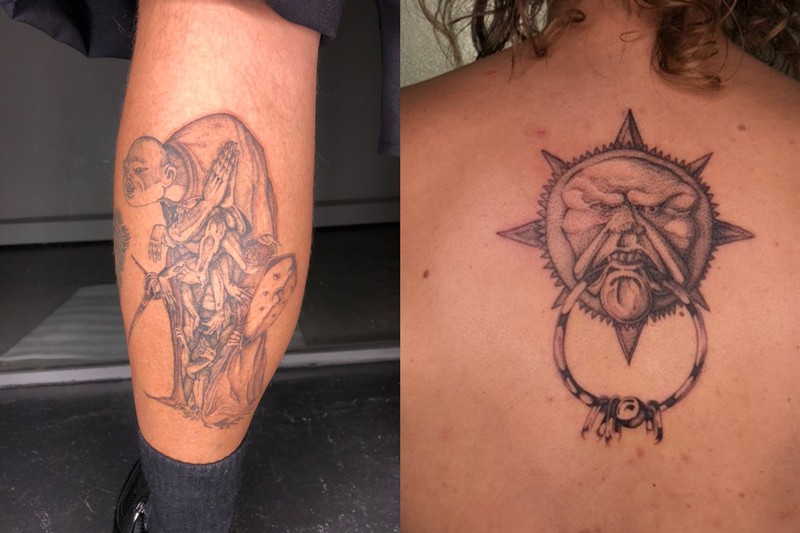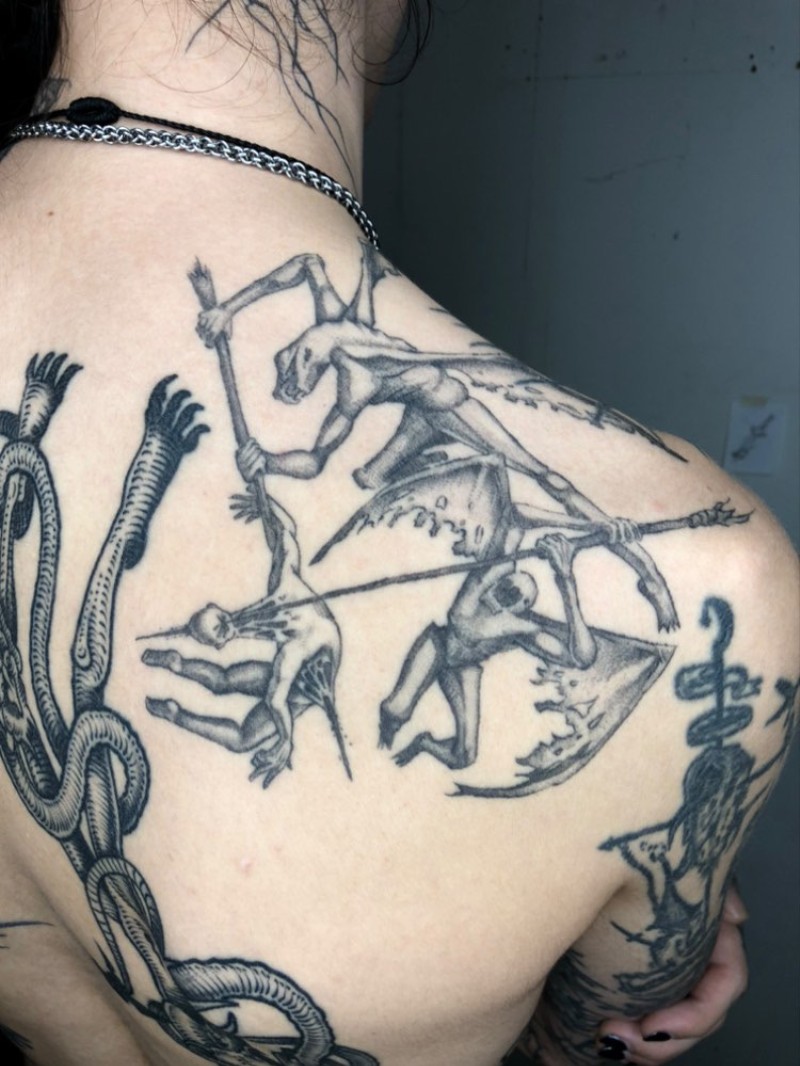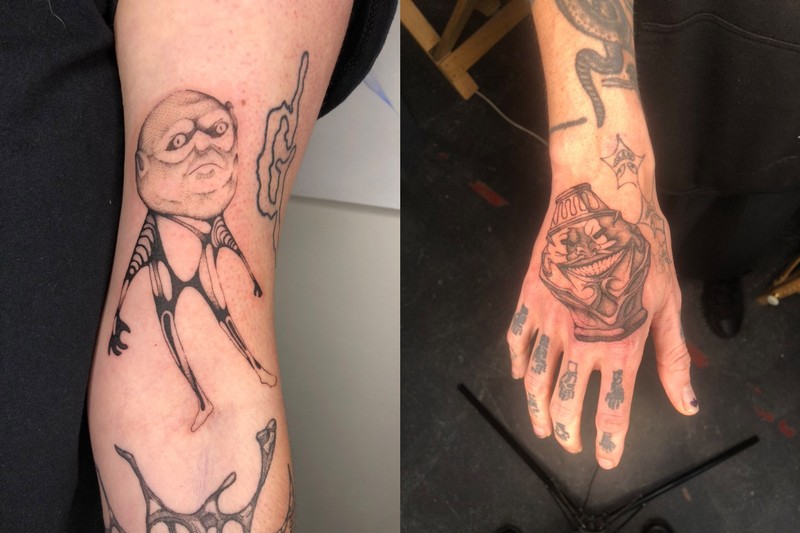Aotearoa isn’t lacking in talented tattoo artists, with many great traditional studios in operation and an influx of young, experimental, self-taught artists building notoriety. You can find local artists doing contemporary blackwork that’ll transport you instantly to sweaty Berlin clubs that lock you in till dawn, drawing up ignorant tattoos like those found on line-cook aesthetic Brooklyn-ites. During the early pandemic, we were lucky enough to have a lockdown-trapped Rita Salt of New York City for over a year, tattooing on our shores. Not so fortunate for them. I got four tattoos out of it, though.
One of the stand-out talents building a reputation for their dark, eerie and sometimes humorous style is a Wellington-based artist who goes by the name Cuck Norris (or Cuck_Norris999 on Instagram)
VICE went to Cuck’s Cuba Street-adjacent studio to chat all things ink – including how they kicked their career off the ground as self-taught artists – and what influences their dark designs. Oh, and we got a tattoo in the process.

VICE: So, who are you? Who is Chuck Norris?
CUCK NORRIS: I am a tattoo artist based in Pōneke. I’ve got a private studio. Self-taught.
And how long have you been tattooing?
I’ve been tattooing for, shit, how long has it been? I’ve had a machine since 2017. But it’s only been the last three and a half years I consider myself tattooing.
Where did the name Cuck_Norris999 come from?
So, unfortunately, Cuck Norris, without any numbers, was taken. I didn’t come up with the name. A friend of mine called Tommo came up with it in 2019.
It was just an Instagram name, a new Instagram handle. Then I started tattooing, and once I had more of a following, I debated whether it was like a name I should keep. But yeah, it was a resounding Yes; you should keep the word from everybody I talked to.
And it’s funny, referring to the tattoos like, Oh, is it a Cuck piece? Just the way people talk about it is amusing.
How does being a self-taught artist work?
I think it’s been a balancing act of my skill level and drawing ability. A downside to being a self-taught tattoo artist, at least for me, is it takes much longer to get good compared to doing an apprenticeship or something where you’ve got constant feedback on what you’re doing and how to improve.
It’s funny because I wanted to be a tattoo artist when I was in high school, but it was something that I put away, which I’m kind of glad I did because I came to Wellington to study instead. But I planned I do an apprenticeship because I’ve always been interested in drawing and tattoos.
But funnily enough, it started with just doing stick and pokes in the first year on myself and my flatmate.
Was that with legit equipment?
No, no, no, no, it was like sewing needles in Indian ink. Eventually, I got a machine because I was tired of how long it took to do stick and pokes. Once I got the machine, I would occasionally tattoo myself or friends out of my bedroom. It wasn’t anything serious.

How did you take it from just being your friends to becoming more of a legit job?
I’d say once I got the confidence and wanted to take it further than just offering it to people I knew… I think Instagram was probably the thing there. Like making my Instagram more tattoo-orientated, posting availability and designs, etcetera.
You have a gorgeous, distinct tattooing style. Where did that come from?
I’ve been drawing my whole life. I’ve always been interested in visual arts.
I think it’s probably because I taught myself how to tattoo. I didn’t have to do a particular style, or I didn’t have someone above me who had a technique I would draw from, even subconsciously. But yeah, just kind of tattooing when I wanted to tattoo, outlining what I wanted to.
I got advice from friends who had more experience when I didn’t know what I was doing. Or if I had a question, I’d ask them about it. But for the most part, in terms of actually tattooing, that was all just trial and error and having willing friends to give me this part of their skin for these tattoos. Y’know, it’s funny seeing them (the early tattoos). You can see how far you’ve come when you look back.
Do your designs have roots in fantasy? To me, it’s very gothic and very science fiction-y.
Oh, yeah. I love fantasy and fiction and everything. There’s definitely a lot of inspiration from the movies, video games, horror games.
I think Berserk, the manga, is one of the most recognisable influences.
It’s not Junji Ito.
No, but Junji Ito is another inspiration.
Berserk’s a big, cult following, dark fantasy. It follows one person over a long period as things get progressively fucked up. The art style is highly creepy—just many demons with human faces. And I think when you look at my drawings, you can see a lot of that.
Were you ever a Silent Hill fan?
I’ve never played Silent Hill, but I’m aware of that iconography.
I see that kind of creature design comparable to some of yours. I love it.

And how do you feel your style has evolved?
For me, it was drawing stuff that I knew I could tattoo. And then I’d reach a critical mass, y’know, feeling like I’m bored with this, I want to try something new. Then it’s this balancing act where my tattooing level increases, so I push my drawing ability. And then my tattooing has to catch up to that. And then, I make my tattoos better than my drawing, and I must push the picture higher.
Do you feel like there’s a general push towards what would be described as experimental or non-traditional tattoos?
I mean, the tattooing scene globally, from what I can see, is at this beautiful point where it’s more about your style and expression than hitting a particular traditional style of tattooing. People are just tattooing how they draw or how they create onto people’s bodies. It may still fit into specific types but is more of an individual expression.
Do you think having an art school background helped you?
I think, in the long run, it has. I wouldn’t say anything directly regarding drawing ability because the school I attended was conceptual instead of skills-based. So you weren’t necessarily taught how to draw or paint, but you were taught how to think about what you’re doing.
The most important thing for me was having that break and going to uni because I was thinking about tattooing straight out of high school. It allowed time for my drawing ability, what I wanted to draw, and my taste to develop.
When did you get your first tattoo?
I think I got my first tattoo when I was 17. But it was all by the book. My mum was tattooed, and they were willing to sign the consent forms.
Do you like what you got?
Yeah… It’s like, I don’t dislike it, but my taste has changed since then. Yeah. Y’know, I don’t think they’re bad tattoos in any regard. I don’t want to remove any of those (early) tattoos, but I think it’s a nice place to work from, with other tattoo artists, like adding layers to them over the years.
That’s an excellent way of looking at it.
On a different tack, what makes a good or bad client in your eyes?
I wouldn’t say I’ve had any bad experiences with clients. Getting a tattoo’s an intimate experience, like sitting with someone for hours and getting to know them…
I think it’s probably just an etiquette thing, not bailing on the day. I’m not going to hold it against the person. I can tell them, ‘Next time, make sure that you set an alarm on your phone or something and let me know’.
I think it’s more important to talk about what you should expect regarding your boundaries and whatnot with your tattoo artist as someone who’s getting a tattoo. Because it is a power dynamic that people do and has used many times in the past, unfortunately. So I think it’s more important to talk about what is and isn’t okay when you get a tattoo. It’s about consent, informed consent.
Totally.
And last but not least, what’s coming up for Cuck Norris?
I’m releasing some new merch, so I guess upcycled, if that’s still a term people use, like, op-shop finds that I’ve been bleaching and dying and putting designs on. I’d say I’ve probably made about 40 to 50 t-shirts, hoodies, and stuff. And I have a little pop-up shop this month on the 17th at Windy Workshops Gallery in Wellington.
Comment and share on this article:
